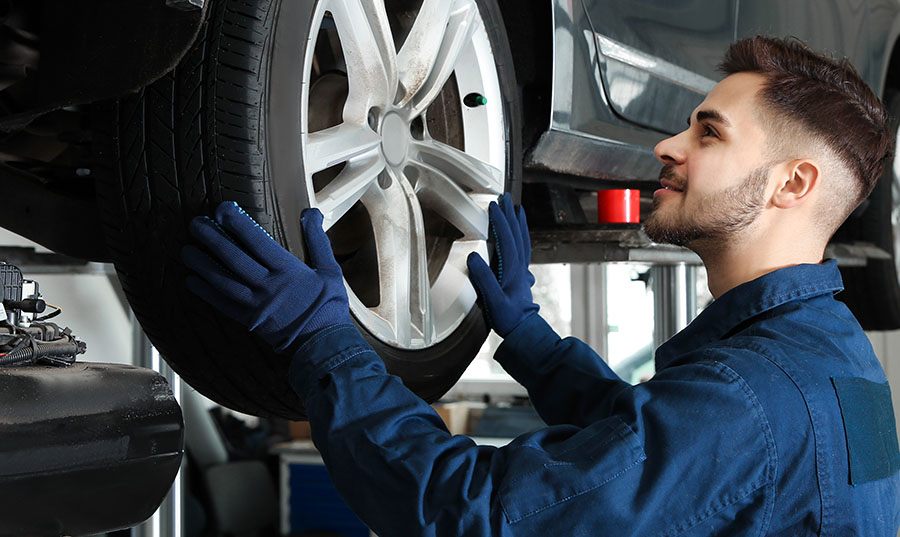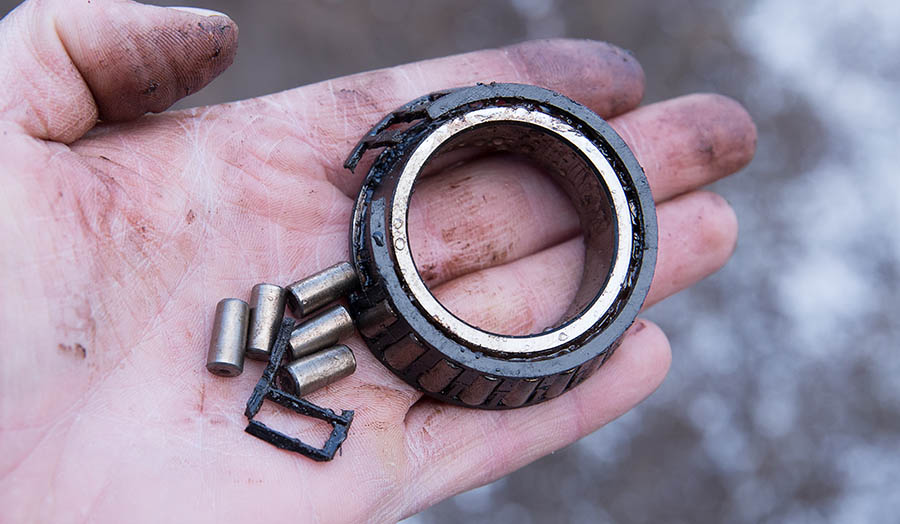Wheel bearings in Mercedes-Benz S-Class are one of the most crucial and stressed components. They cause the wheels to turn easily and at the same time absorb high radial and axial forces. Driving your S-Class with a defective wheel bearing can be dangerous, so you must act urgently for your safety and driving comfort.

The most common symptoms of a bad wheel bearing in Mercedes-Benz S-Class are grinding or humming noise, knocking or clunking noise when cornering, shaking steering wheel, body vibration, uneven or abnormal tire wear, play in wheel, and vehicle pulls to one side when driving in a straight line.
Symptoms
Grinding or humming noise
Grinding or humming noise in the cabin of S-Class from the direction of the affected wheel is one of the earliest signs of a bad wheel bearing. The faster you drive your vehicle, the louder the humming noise gets. Damage to the wheel bearing is not easy to notice in the preliminary stages, as the noise is barely noticeable. In many cases, however, the noise builds up after a short time – often after a few hundred miles.
Steering wheel vibration
A bad wheel bearing can cause vibrations in the steering wheel of S-Class, particularly if the front wheels are affected. If only the rear wheel bearings are defective, the vibration is mostly felt from under the seats.
Steering wheel vibration is most commonly caused by unbalanced wheels, therefore you should only consider bad wheel bearing in this case if the vibrations are accompanied by humming or grinding noise.
Knocking or clunking noise when cornering
At an advanced stage of internal deterioration, the defective wheel bearing can cause knocking or clunking noises, particularly when turning or cornering in your Mercedes-Benz S-Class. However these noises can also occur due to faults in suspension or steering system components, therefore you should consider a bad wheel bearing if the vehicle presents other system as well, like humming or grinding noise and play in the wheel.
Uneven tire wear
If you notice that the tires in your S-Class are wearing unevenly, for example losing more tread on the inside, this can also be related to a bad wheel bearing since it can disturb the alignment of the vehicle.
S-Class pulls to one side
Since a bad wheel bearing can affect the alignment of the vehicle, your S-Class will pull to one side when driving in a straight line. Even when cornering, you may feel the handling of the vehicle a bit off.
Play in wheel bearing
You can also recognize a defective wheel bearing if there is too much play. Jack up your Mercedes-Benz S-Class until the wheel can move freely. Then grab the wheel with both hands at the opposite sides and alternately press and pull. If the play is clearly noticeable and visible, then the wheel bearing is very likely defective. However, this technique requires some experience and a practiced grip.

Should I replace only the defective wheel bearing in S-Class?
In general, it is advisable to change the second bearing on the same axle even if there is only one defective wheel bearing in your Mercedes-Benz S-Class. It can be assumed that both bearings were subjected to roughly the same stress and that the failure of the second bearing is imminent. If they are replaced at the same time, this saves time and money.
What causes bearings to fail in Mercedes-Benz S-Class?
Even when driving your S-Class in a straight line, the bearings have to absorb high radial forces. The entire weight of the vehicle rests on the bearings. When driving, the speed creates additional forces. If a curve is then also driven through, axial forces occur. High impacts on the bearings also occur on uneven roads or when driving through potholes. Impacts of all kinds are much more damaging to bearings than the high loads. Therefore, all wheel bearings eventually fail. However, how soon they fail depends on driving habits. Other factors can also contribute to premature bearing failure on your S-Class, like driving with unbalanced tires or poor wheel alignment.

Premature wheel bearing failure due to contamination
When the wheel bearing rotates, there is high friction. Therefore, the internal components must be lubricated with lubricants such as grease or oil to prevent overheating. The wheel bearings in Mercedes-Benz S-Class are designed in such a way that they are absolutely maintenance-free. This is achieved with a grease filling that ensures adequate lubrication of the rolling elements over the entire service life of the wheel bearing.
Elaborately designed seals ensure that neither water nor dirt can enter the wheel bearing. But if the seals fail, water and dirt can enter inside the wheel bearing and contaminate the lubricant. These contaminants circulate throughout the grease and between the races and the bearings accelerating the wear rate. The increased heat may break down and eventually expel the lubricant, leading to premature failure of the bearing.
Will a bad wheel bearing affect ABS?
Wheel bearings are safety-relevant components. They are responsible for stable driving behavior and, depending on the version, provide the wheel speed information for the anti-lock braking system. If the wheel bearing is defective, the anti-lock braking system can also be disabled. In the event of emergency braking, this has a negative effect on the braking distance and the steerability of the vehicle.
Is it safe to drive S-Class with a bad wheel bearing?
A wheel bearing is located within the wheel hub, and is responsible for connecting the wheel to the vehicle. If you continue driving your S-Class with a bad wheel bearing for months, in worse case scenario the wheel can lock up while driving or even fall off. Therefore a bad wheel bearing must be replaced as soon as possible when symptoms first appear.
How long do the wheel bearings last in Mercedes-Benz S-Class?
Under normal driving conditions, wheel bearings typically last around 100,000 miles. The mileage depends on the driving style and the quality of the wheel bearing. If you frequently drive your S-Class on bad roads with lots of potholes, drive over curbs with force or drive quickly around corners, the service life of the wheel bearings is significantly reduced.
How long does it take to change a wheel bearing?
Replacing a single wheel bearing of S-Class typically takes 1 to 2 hours for an experienced mechanic. Sometimes it can take longer if the wheel hub is stuck, it then requires a lot of hammering or use of different tools and techniques to remove the hub. There are also a lot of moving parts that need to be removed and then properly reinstalled to complete the task. Due to the complexity and sheer manual labor, it is not recommended as a DIY project.
Recommended video
Conclusion
If there is noticeable grinding or droning noise inside the cabin of your Mercedes-Benz S-Class when driving, you should definitely consider bad wheel bearings. However you should not hurry in replacing the bearings as sometimes the symptoms can be caused by something else, for example tire cupping (type of uneven wear) can also cause humming noise inside the cabin.
In any case, it is advisable for laypersons to visit a workshop. A professional mechanic can swiftly diagnose the problem for you.









